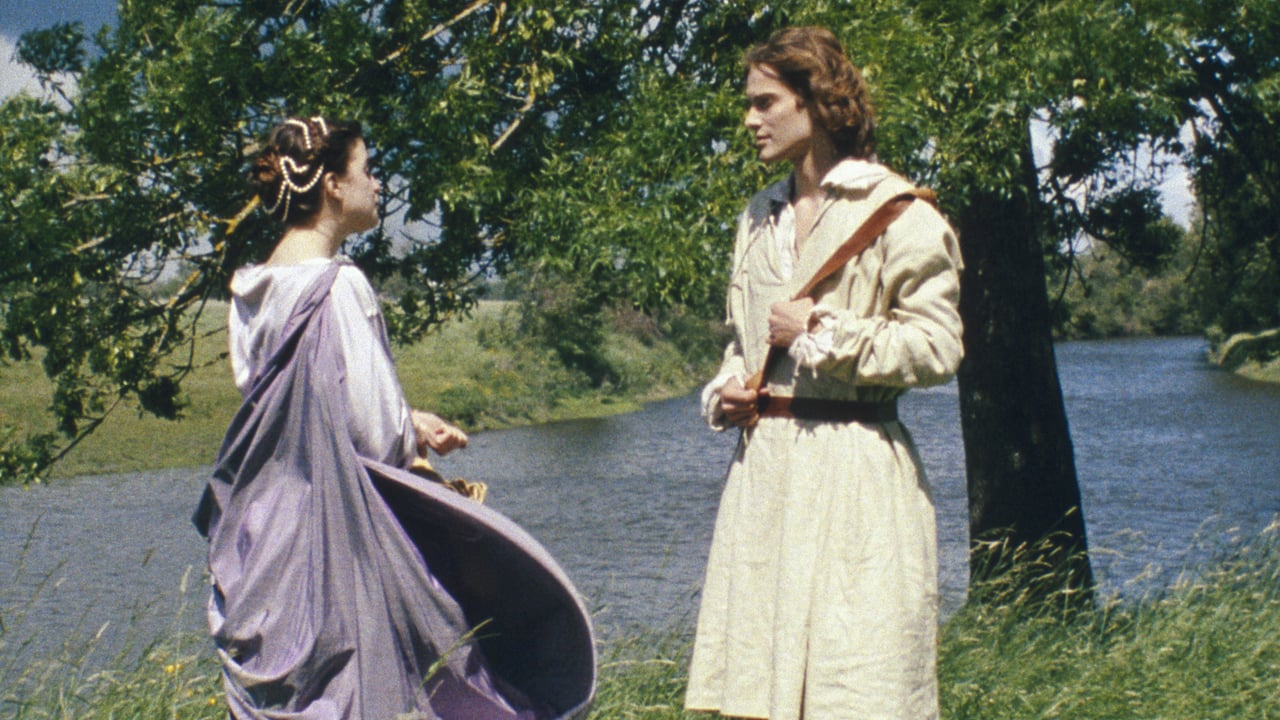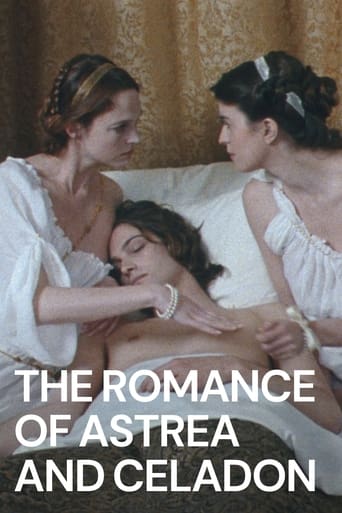

This was Eric Rohmer's last movie, which he made in 2007 at 87 (he would die three years later). He decided to close his distinguished career by filming a famous French pastoral novel of the 1600s, considered unfilmable by those who have read it. Rohmer, who before becoming a director was a professor of French Literature, has always been one of the most literary of all directors. The action takes place in an anachronistic, fantastic Gaul among a rural community of shepherds. The silly, absurd plot (which is never played for laughs) has the shepherd Celadon fled the village after his love Astrea suspects him of "making merry" with another shepherdess during a party there. Astrea is led to believe that he drowned in the river while fleeing, and she mourns him madly, but he has actually been rescued by a community of nymphs, who live in a renaissance-style castle and whose leader is mad with Celadon and doesn't let him leave the place (in the film, every woman is madly in love with Celadon). One of the nymphs eventually gets the head druid involved (who sputters platitudes and new age like nonsense and is played by Serge Renko, who was the Soviet spy in Triple Agent - Rohmer's previous, great film, sadly little known). Not very profound, and a bit of a gimmick, this bucolic, languid film is pleasant to watch. The young, little known beautiful actors, who always say their lines in perfectly enunciated French, help.
... View MoreApparently Astrea and Celadon are in love but cannot publicly display it since their families hate each other. So, Celadon pretends to love another--and ultimately Astrea incorrectly assumes he is being unfaithful to her. So what does this knucklehead do? He tosses himself into the river when she confronts him and tells him never to talk to her again. She naturally assumes he drowned in the river and sulks through most of the film. However, and this is really odd, he does not reveal to her that he's alive--after all, she DID tell him never to speak to her again AND he was the perfect lover and could not violate this command. So, to get around this command, later he is introduced to her as the druid priest's daughter--and she/he and Astrea become close friends and confidantes.I understand that director Eric Rohmer is a beloved New Wave director and I understand that the reviews for his final film, "The Romance of Astrea and Celadon", are mostly very positive here on IMDb. However, despite knowing I SHOULD love his work and this film, try as I might, I just don't get this adoration. Sure, I have enjoyed a few of Rohmer's films but by and large, I just can't help but feel perplexed by his fans. And, of all the films of Rohmer's I have seen, I think that, to me, "The Romance of Astrea and Celadon" is perhaps the least enjoyable. The plot made little sense, the plot device of having Celadon dress as a woman made even less sense and the film just seemed incredibly talky and dull. If this is about what true love is supposed to be about, then I guess I know absolutely nothing about love---I just thought Celedon was a bit of a yutz and his actions seemed less like the ideal lover and more like a complete fool.So was there anything I liked about the film? The cinematography was nice and the director did create an amazingly beautiful and sensual picture. But the plot made no sense, the story quite slow and the film bored me to tears. I just don't seem to see in this film what everyone else sees.
... View MoreEric Rohmer's announced last film, The Romance of Astrea and Céladon, is a costumed period piece based on a 1610 novel by Honoré d'Urfé that imagines what life was like in Fifth century Gaul. It is a work of sublime physical beauty and surprising eroticism that looks both backwards and forwards in time. While it appears to be a look back at a naive and outdated way of life, it may indeed be the opposite - Rohmer's final rebuke of the spiritual emptiness of the modern world, and a preview of a new world struggling to be born. This strange dichotomy is implied by the unusual preface in which a voice announces that the story had to be moved from the Forez plain, "now disfigured by urban blight and conifer plantations, to another part of France whose scenery has retained its wild poetry and bucolic charm." Rohmer transports the viewer to a world of idyllic streams and forests where shepherds dress in the tunics of the Seventeenth century. Celadon (Andy Gillet), a young man of noble birth has chosen the simple life of a shepherd and is deeply in love with Astrea (Stephanie Crayencour), a shepherdess of more modest family lineage. Though the film in lesser hands might have seemed a bit silly, Rohmer's straightforward direction reveals an emotional truth often obscured by modern cinematic techniques of fast cuts, hand-held camera-work, and curse words that are supposed to enhance "realism.At a family gathering, Céladon pretends to be infatuated with Amynthe (Priscilla Galland) to mollify his and Astrea's parents who are bickering, but when Astrea sees him kiss the other woman, she is racked by jealousy and orders Celadon to stay away from her forever "unless I bid you otherwise". In despair, Céladon says "I'll drown myself, at once" and proceeds to jump into the river at once, but is rescued before drowning by the nymph Galathea (Veronique Reymond) who brings him to her castle and, with the support of two other nymphs, nurses him back to health.When Galathea discovers how attractive he is, however, she wants Céladon for her own pleasure and forbids him to leave the castle but, in the film's first instance of cross-dressing (a notorious Shakespearean plot device), he is smuggled out by another nymph, Leonide (Cecile Cassel) and hides out in the woods. Astrea believes Céladon to be dead and with some regret, forgives him and loves him more than ever, though Céladon refuses to see her out of respect for her word. He begins to rethink his position, however, after being visited by a druid priest (Serge Renko) who hatches a secret scheme to reunite the two lovers.The Romance of Astrea and Céladon is filled with a lightness that is absent from Rohmer's more talky Six Moral Tales and later films in which the characters pontificate at length on the ins and outs of romantic love. His philosophical (and Catholic) bent surfaces, however, in a scene in which Hylas (Rodolphe Pauly), a jester, who is regarded with complete disdain by others, berates the follies of indiscriminate sexuality while Lycidas (Jocelyn Quivrin) promotes love as an ideal that merges two souls into one and the film's robust final sequence demonstrates the extremes one may go to for love.In The Romance of Astrea and Céladon, Rohmer, now in his 87th year, promotes the ideals of commitment, the integrity of one's word, and the poetry of romantic love without its modern day clatter. While these ideals may not seem terribly exciting (one film critic wrote that, "maybe humankind ditched romantic fidelity because it isn't exciting!"), they act to ground us in our noblest aspirations, to remind us of what it means to be human, a task that, in his six decades of film-making, Rohmer has exquisitely accomplished and which The Romance of Astrea and Céladon places a final exclamation point.
... View MoreCanadians are too polite to boo but the audience at the Toronto Film Festival left the theater muttering that they would rate this film 0 or 1 on their voting sheets. The premise is that a modern filmmaker is interpreting a 17th century fable about the loves of shepherds and shepherdesses set in the distant past when Druids were the spiritual leaders. Working in three epochs presents many opportunities to introduce anachronisms including silly and impractical clothing and peculiar spiritual rites that involve really bad poetry. Lovers are divided by jealousy and their rigid adherence to idiotic codes of conduct from which cross-dressing and assorted farcical situations arise. The film could have been hilarious as a Monty Python piece, which it too closely resembles, but Rohmer's effort falls very flat. The audience laughed at the sight jokes but otherwise bemoaned the slow pace. The ending comes all in a rush and is truly awful. This is a trivial film and a waste of your movie going time.
... View More